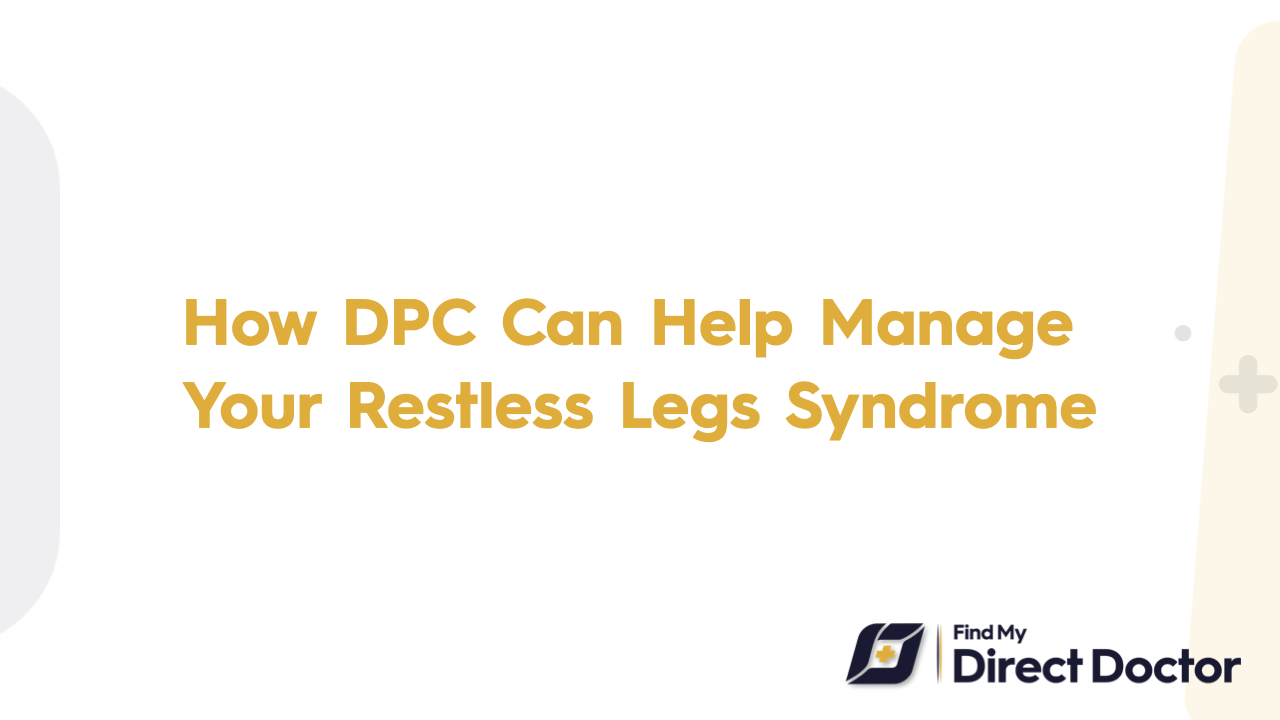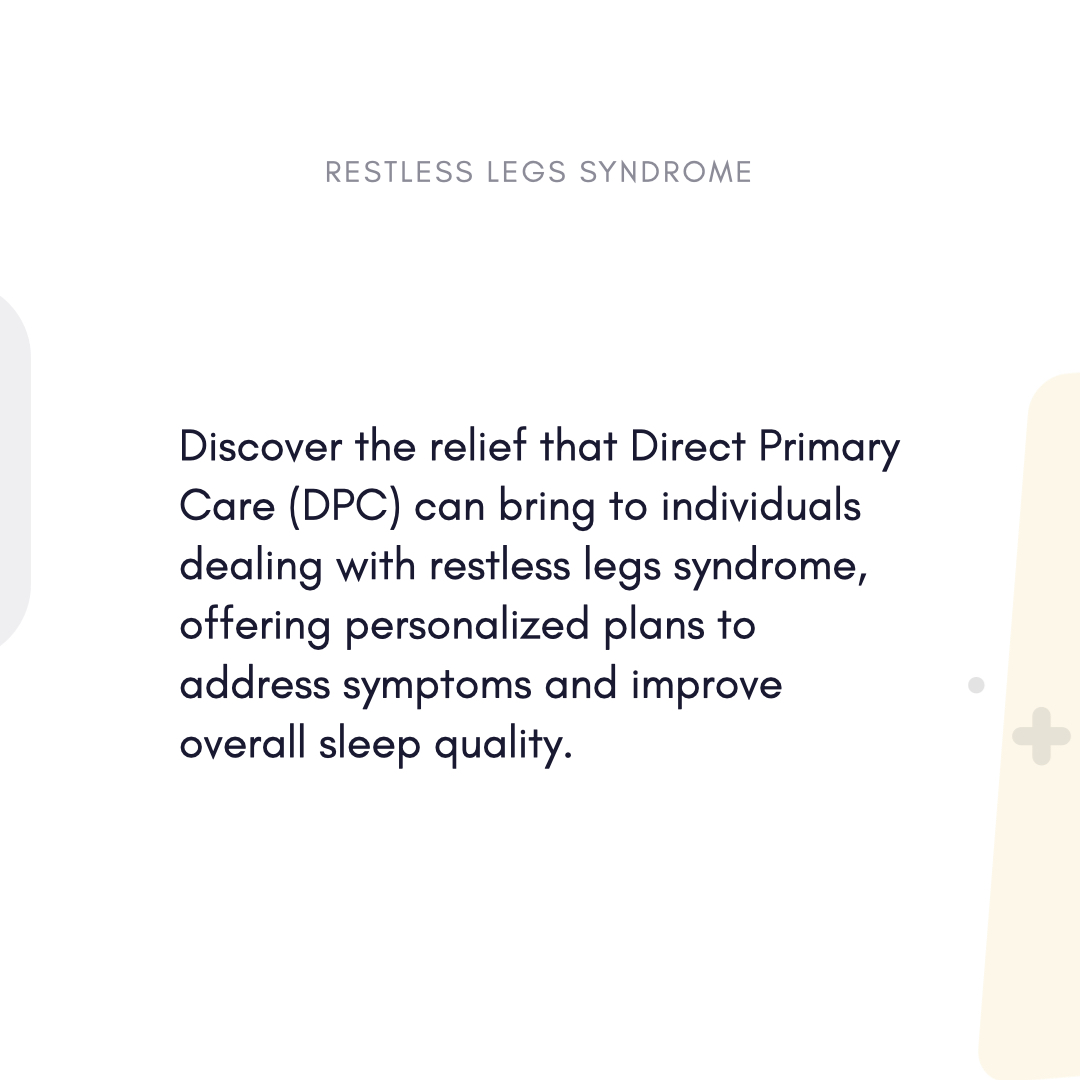Restless Legs Syndrome (RLS) and Direct Primary Care (DPC): Calming the Urge to Move with Personalized Care
An irresistible need to try to fall asleep by moving your legs. Nights passed pacing rather than sleeping. For ten percent of adults suffering with Restless Legs Syndrome (RLS), this neurological condition robs sleep and sanity. Although conventional treatment usually prescribes pills without looking at underlying causes, Direct Primary Care (DPC) offers a complete approach to silence your legs and bring peace.

Acknowledging Restless Legs Syndrome
RLS is distinguished from others by:
- Uncomfortable leg tingling and crawling at rest
- Urge to move legs; usually worse at night
- Disturbance of sleep causing daytime tiredness
Usually occurring triggers:
- Lack of iron
- Expectancy
- Diseases including chronic ones (kidney failure, diabetes)
- Medications (anti-histamines, antidepressants)
Risks addressed: Depression, long-term insomnia, lower quality of life The International Restless Legs Syndrome Study Group stresses tailored pharmacotherapy and underlying cause treatment.
DPC Revolutionizes Usually costing 50 USD–150 USD/month, RLS Care Direct Primary Care (DPC) runs on a membership model and provides flat fee access to your doctor. This translates for RLS patients into no co-pays, no hurried visits, and a care plan as restless as your legs.
1. Analysis of Root Causes and Instant Relief
The transparent approach of DPC guarantees:
- Studies on same-day iron intake Ferritin <75 μg/L sets off supplements.
- Review medications: Change SSRIs or dopamine blockers aggravating RLS.
- For severe cases, immediate interventions call for either low-dose opioids or gabapentin.
2. Customized, Guiding-Based Treatment
DPC doctors design customized plans compliant with IRLSSG guidelines:
- IV iron infusions for quick relief of symptoms optimize iron intake.
- Dopamine agonists: Pramipexole/ropinirole with compulsive behavior monitoring.
- Non-pharmaceutical approaches include pneumatic pumps, compression sleeves, CBT-I for sleep.
3. Complete, Reasonably Expensive Support
DPC lowers physical and financial burden by:
- Cutting prescription costs: gabapentin enacarbil's wholesale pricing is...
- 24/7 telehealth access helps to control dose changes or augmentation syndrome.
- Lifestyle coaching covers sleep hygiene, caffeine reduction, and leg massages.
DPC's advantages for RLS sufferers
1. Unmatched Reachability
- 24/7 visits during side effects from medications or nighttime flares.
- Not waiting times for sleep studies or specialist referrals.
2. Customized Treatments
- Safe stretches and iron infusions define pregnancy RLS.
- Cases of refractory either cannabis coordination or rotigotine patches.
3. Clear Affordability
- Membership consists in consultations, labs, and care coordination—no additional costs.
- Typical savings: 2,000 USD+ yearly from drug mark-ups and sleep clinic fees avoidance.
Personal Success Stories from Real Life
- Case 1: DPC gave Sarah, 32, with a ferritin of 30 IV iron. Two weeks passed with RLS symptoms gone.
- Case 2: Mike, 58, on SSRIs changed under DPC direction to take bupropion. Sleep repaired free from RLS flares.
RLS and DPC FAQs:
- Q: Can DPC manage strong augmentation from dopamine agonists?
- A: Sure. DPC doctors cut off problematic drugs and switch to alpha-2-delta ligands.
- Q: DPC without insurance is reasonably priced.
- A: Certainly. Members avoid neurology co-pays and save IV iron (200 USD vs. 1,500 USD).
- Q: Regarding RLS genetic testing, what about that?
- A: If family RLS is suspected, DPC coordinates BTBD9 and MEIS1 gene testing.
Why DPC Wins for RLS Patients?
Emphasizing DPC's alignment with RLS guidelines, the World Association of Sleep Medicine supports:
- Treating depending on ferritin levels and comorbidity profiles is based on precision.
- Tools to monitor triggers and symptoms help empower you.
- Trust: One committed provider replaces scattered, trial-and-error treatment.
Get Back Restful Nights and Active Days.
Restless Legs Syndrome need not control your life. With DPC, you get a partner who walks with you toward calm—step by step, night by night—who listens deeply, treats comprehensively, and walks with you.






